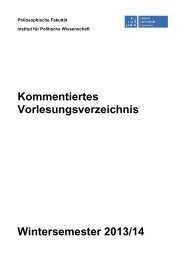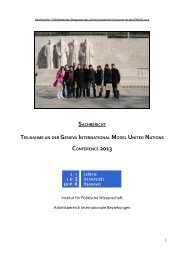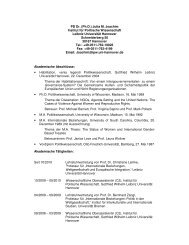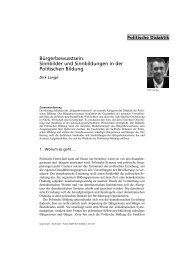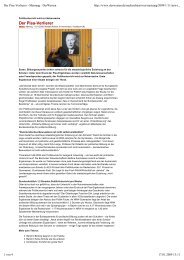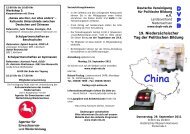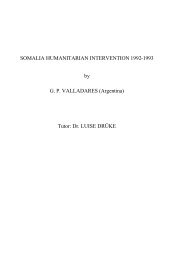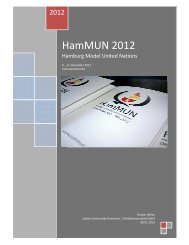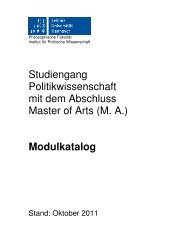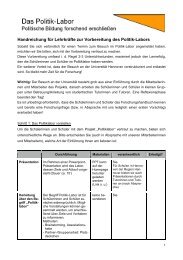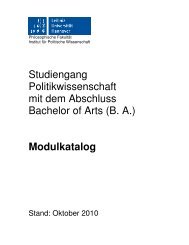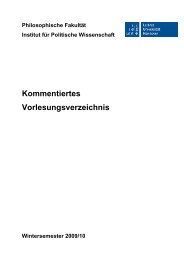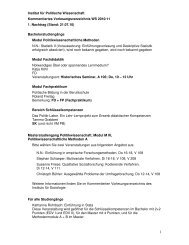Preventive Action for Refugee Producing Situations
Preventive Action for Refugee Producing Situations
Preventive Action for Refugee Producing Situations
You also want an ePaper? Increase the reach of your titles
YUMPU automatically turns print PDFs into web optimized ePapers that Google loves.
172 Chapter 4<br />
Brian Urquhart advanced recently some innovative suggestions to address<br />
funding problems. They are:<br />
- Shift peace-keeping costs to defense budgets<br />
- Introduce a sort of "levy" on private companies, especially in the<br />
filed of shipping or air transport, since they are clearly benefitting<br />
from peace-keeping activities, and<br />
- Impose a 1% "tax" on all international arms transactions. 393<br />
In fact the Italian Government has already introduced a new mechanism in this<br />
regard. By law 180 (6 Febraury 1992), it has established that in order to<br />
finance Italy's participation in "peace and humanitarian initiatives in the<br />
international field" it is possible to deploy not only funds appropriated "ad<br />
hoc", but also up to 1% of the funds allotted <strong>for</strong> development assistance (if<br />
such initiative relate to developing countries). 394<br />
On 13 May 1992, Secretary General Boutros Boutros-Ghali delivered a<br />
lecture in Washington where he also addressed the funding problem of peacekeeping.<br />
He stated, given the political will, the funding problems could be<br />
easily resolved and suggested the following four steps:<br />
1. A revolving capital fund would be established to finance the start-up cost of<br />
peace-keeping operations;<br />
the Secretary-General, p. 2.<br />
393 Speech to the "Cosmopolitan Club", New York City, February 1992. In New<br />
York Review of Books, April 9, 1992, p. 42. Cited by Roberto Toscano. Address<br />
on "Peace-keeping in the New International Situation" at the International<br />
Symposium Prospects of Re<strong>for</strong>m of the United Nations System, Rome, May<br />
1992, p. 23.<br />
394 Law 180 mentions specifically the supply of goods, services and financial<br />
contributions to "international organizations, <strong>for</strong>eign countries, Italian and <strong>for</strong>eign<br />
private and public entities having as a goal the maintenance of peace and<br />
international security, as well as initiative in the humanitarian field and with the<br />
goal of protecting human rights". Given Italy's very substantial ef<strong>for</strong>t in the field<br />
of development assistance to LDC's, Italian participation in peace-keeping ef<strong>for</strong>ts<br />
in the third world is not likely to run the risk of being inadequately funded. It<br />
would be an important step if other countries would make such budgetary<br />
arrangements to solidify the linkage between peace and development. The<br />
meaning of the linkage is twofold: "there is no peace without development", but<br />
also "development assistance is useless unless there is peace". See in Roberte<br />
Toscano's address on "Peacekeeping in the New International Situation" at the<br />
International Symposium on Prospects of Re<strong>for</strong>m of the United Nations System,<br />
in Rome, April/May 1992, p.24/25.<br />
New Approaches and Policies 173<br />
2. As soon as the Security Council decided to set up a new operation, the<br />
Member States would be asked to pay immediately one third of the<br />
established cost of its first year and the Secretary-General would be<br />
automatically given the authority to commit up to this sum;<br />
3. A reserve stock of basic peace-keeping equipment would be established so<br />
that some of the most needed items were always available;<br />
4. Member States would pay their assessments, both <strong>for</strong> the initial one third<br />
and <strong>for</strong> the full budget, fully and on time. 395<br />
Mr. Boutros Boutros-Ghali, looking at the costs of peace-keeping,<br />
reiterated at this occasion his belief that even the UN calculated<br />
estimated amount of $2.7 billion <strong>for</strong> this exceptional year is not high in<br />
relation to the costs of the alternative, namely, continued conflict. On the<br />
same occasion, he said that one only needs to recall the astonishing sums<br />
of money that were spent to 'win' the cold war - in the 1980s global<br />
expenditures on arms approached $1 trillion per year, or $2 million per<br />
minute - to acknowledge that peace-keeping is an inexpensive way to<br />
help maintain stability in the post-cold-war-era.<br />
Aware that the current volume of peace-keeping expenses is creating<br />
real problems <strong>for</strong> Member States, the Secretary-General has started to<br />
review existing operations <strong>for</strong> identifying possible areas of saving<br />
without affecting their effectiveness.<br />
In considering cost and effectiveness, it is also encouraging to see<br />
that of the 13 operations established since 1988, six have already<br />
completed their mandate. These include two in Africa, in Namibia<br />
(UNTAG), where 46 000 refugees could start to live afresh through<br />
UNHCR's support, and where free and fair elections were successfully<br />
carried out in November 1989 under UN supervision; and in Angola<br />
(UNAVEM I), where from 1989 to 1991, the UN military observers<br />
monitored and verified the withdrawal of Cuban troops. In the Middle<br />
East, the Military Observer Group (UNIIMOG) that monitored the<br />
implementation of the cease-fire between Iran and Iraq following their<br />
eight-year war, withdrew with the agreement of both parties in 1991. In<br />
Central America (ONUCA), observers monitored the cease-fire in<br />
Nicaragua, helped to verify the cessation of aid to irregular <strong>for</strong>ces in the<br />
region; and assisted in the voluntary demobilization of the Nicaraguan<br />
resistance. They were withdrawn in January 1992. In Cambodia,<br />
following the signing of the Paris peace accords in October 1991, an<br />
___________________________<br />
395 SG/SM/4748,13 May 1992. Secretary-General Delivers Ninth David M.<br />
Abshire Lecture, "From Peace-keeping to Peace-building ” , Press Release,<br />
United Nations, New York, p. 7.



